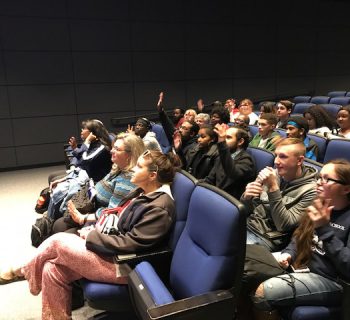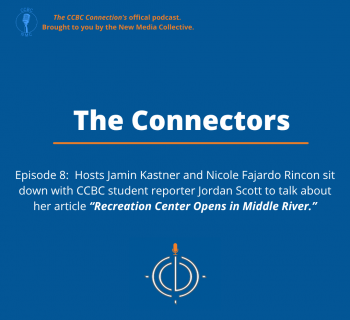Hanna Savanuck
Located in the Arts and Humanities building on the Essex campus at CCBC, is a classroom full of students who are eager to learn about how the rest of the world communicates. This course, Intercultural Communication, is designed to help students examine cross- cultural lifestyles, skills, and forms of expression through analysis and application.
Within this active classroom, Guillermo Gibens encourages his students to engage in thought provoking discussions about international cultures. The study of this specific type of communication provides students with the necessary skills to not only adapt to rapidly growing diverse conditions, but also opportunities to gain a deeper understanding of different types of cultural expressions.
For communication majors specifically, this course will help broaden one’s understanding of how various cultural societies express themselves.
“It’s a share of values, beliefs, and behaviors that allow us to share the same concepts with a group of people. In terms of culture, I think that this course benefits people because it will give you the tools necessary to evolve yourself into a multicultural person and feel confident about what you’re doing,” Gibens says.
Born and raised in Venezuela, Gibens believes that learning about foreign issues with communication is an important tool in life.
“Being in a different culture with different students, I bring that [my experience] to class. Back in Venezuela, I was working at an advertising agency and I was doing a lot of commercials, like documentaries for a company, and I [became] experienced being a production coordinator for these films,” he says.
It was within this agency that Gibens realized his passion was communications, but it wasn’t until he was searching for jobs in Kansas City that he decided he wanted to become a professor.
“I finished my Master’s Degree and ended up applying for a job as a visiting professor at the University of Missouri. That was my first time I was going to be teaching journalism. At that point, I realized that I wanted to become a professor,” Gibens explains.
He goes on to mention that although the class – Intercultural Communication – is not a requirement for all students, it should be. Gibens’ real life experiences in classrooms all over the world make him the ideal teacher for this subject.
In fact, Gibens had been working in Dubai at the time he accepted the offer to teach at CCBC. He has also been traveling to Thailand every summer, spring, and Christmas break to teach courses such as mass media research and the history of journalism.
From China to Dubai, he has taught various classes and workshops for students of different ethnic cultures and backgrounds.
“I have taught in Thailand, Peru, India. I taught educational workshops in Vietnam and I have done that online in Colombia, South America,” Gibens says.
However, out of all his travels, he expresses that Thailand holds a special place in his heart. Along with his enjoyment of the food that this country offers, his familiarity of the region contribute to his fondness of the country.
“I have been going there for so many years that I feel so comfortable,” he mentions. “I know the culture, and I know how to get around.”
Gibens contributes his desire for traveling to his teaching style and believes that everyone can get something from this course. Furthermore, he believes it should be a required course for all students.
He points out, “We have seen, almost daily, instances where people are mistakenly doing certain things because they don’t realize there is a different culture involved, and it creates an issue.”
Gibens elaborates by saying, “People should all be required to have intercultural communication training because in any kind of job that you have, you may face a situation where you should [think and] take a step back. I hope that someday CCBC will require intercultural communication as a General Education course.”
Professor Gibens has also formed and organized a Hispanic and Latino group at CCBC, called Mundo Hispano. This club encourages students to discuss cultural aspects of the Latino community and is open to anyone, regardless of ethnicity. For those who are interested in joining, this group meets every Tuesday at 2:30 in office 225 in the Arts and Humanities Building on the CCBC Essex Campus.
In addition, many colleges and universities are actively making a concerted effort in getting the word out about studying abroad. For those who are interested in gaining cultural experience in their career, going abroad and becoming familiar with different cultures can benefit them, both in their education and their future career. These programs offer hands on experiences in leadership and communication, which can open potential career opportunities in the future.
Although it can be scary to venture into an unknown part of the world, many professors these days encourage students to step outside of the box and take a chance to study somewhere new, within their declared major.
Traveling to foreign countries can be an eye opening and life changing experience for those who have minimal travel experience. For students who wish to travel, Professor Gibens will help them prepare for their journey by diving deep into Intercultural Communication.
Gibens plans to continue traveling the world and bringing his real life adventures to the classroom. He encourages all students to learn about the world and its many cultures by saying, “How people can live together with being different is important for the future of the United States.”















I fully support and agree with what Hanna Savanuck wrote about in this article. Having the ability to learn and digest other cultures through traveling abroad allows students to better see from other people’s perspectives. I loved how Savanuck talked about other student’s experiences and it really inspired me to go to Thailand as well and learn an embrace a completely different culture to the one I’m used to.
I fully support and agree with what Hanna Savanuck wrote about in this article. Having the ability to learn and digest other cultures through traveling abroad allows students to better see from other people’s perspectives. I loved how Savanuck talked about other student’s experiences and it really inspired me to go to Thailand as well and learn an embrace a completely different culture to the one I’m used to.
I agree that this class should be a requirement. In high school, I did not have an option as a class that related much to what intercultural communication practically looks like in day to day living. It would have been helpful in a society that is quick to promote internships and work opportunities at a relatively young age. If not an option in high school, then it should definitely be considered as a requirement for college. A class like this is wildly practical for young adults entering the workforce or living on campus.
First of all, the experience of Professor Gibens is so impressive! I truly wish I could travel to so many countries and learn about different ways people see the world around us. I have been raised in Poland myself, I lived in Europe my entire life so I truly appreciate the additional effort people make to communicate well, knowing I was raised in a different culture. It’s a sign of respect and it resonates very well with me when having conversations with Americans.
I really liked this article because I feel the same way. I love hearing about different cultures and meeting different people and learning how they were brought up and the Do’s and Don’t of what to do in their countries. I still would like to venture out to different places and meeting different people.
It honestly amazes me that people like MR. Gibens feels such enthusiasm and passion about intercultural communications. I 100% agree with him that it is extremely important for all of us to learn how to communicate with all those different cultures. I personally have had many incidents where people did not know how to properly communicate with me or even towards me because of my ethnicity and it shouldn’t be that way. This is a course that I would most likely be interested in taking in the future.
Mr. Gibens is pretty remarkable for traveling to teach in foreign countries and then bringing those experiences back to his CCBC students. I will definitely be considering taking his intercultural class to better prepare myself for studying abroad. It would also be useful to become more diverse and learn about other cultures.
The message which carries through this article is awesome which also talks about those students who really want to connects to from other different cultures. To acknowledging these steps the students will get the chance to feel like home in college especially those who came far from for further studies. Prof. Gibens is awesome as always. I had a chance to know about his teaching technique because I had a class with him which never realized that I was in class.